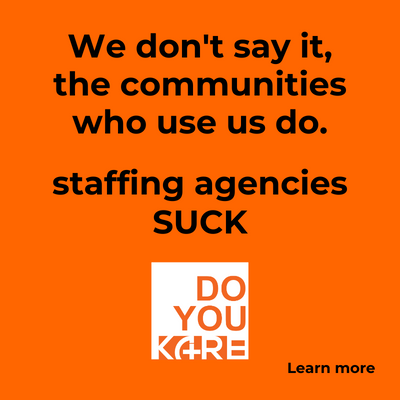Person Centered Care . . .maybe sort of . . . not quite hitting the mark
I wish I could remember who said this and at what conference, but recently I came across it in my notes, but couldn’t figure out where it came from. If it is your thing please let me know so I can give credit . . . . An update, thanks to John Rimbach of West Living. This idea came from Bryan Williams who did a presentation this spring at the California Assisted Living Association Annual Northern California Meeting)
You cannot go to a senior living conference without hearing multiple speakers talking about serving residents, but perhaps that is not really quite right. Perhaps rather than, or more accurately in addition to, serving we ought to be thinking about our residents in the context of “How do we have more engagement?”
Person-Centered Care . . . maybe sort of . . . not quite hitting the mark
I have this very ambivalent view of “person-centered care,” “person-directed care,” “culture change,” all sort of pointing to the idea that in most senior living care settings the management and staff of the community, in effect end up telling the residents what to do and how to live their lives.
Traditionally residents have to get up within a scheduled window; they have to eat at scheduled times; they have to attended a certain number of scheduled activities; they have to make their physician appointments fit within the transportation schedule of the community; they have to take a bath on the right days; and do their laundry (or have it done) on certain days and at certain times. I get it, if everything was “on demand” there could be an explosion of costs for the community, but here is the problem . . . it just does not look so much like their old life at home.
So this person-centered care thing is all about, under ideal circumstances, giving residents complete 100% control over these things and the senior community figuring out how to make that happen.
Sounds great and yet . . . .
It ultimately still kind of looks like a parent-child role. Sure a very permissive and indulgent relationship where the indulgent parent (the senior community management) “LETS” the resident have control over all these things.
Too harsh? . . . maybe . . . just thinking here
I would like to suggest a really radical extension to person-centered care and that is that somehow we need to find time to have real meaningful engagement in three areas:
- Staff and residents need to be friends; they need to be engaged in each other’s lives. Sure staff needs to be trained to use discretion in what they disclose about their lives but that is how we already do our social interactions. They need to know each other’s stories.
- Staff and family members need to be friends; they need to engage in each other’s lives. They need to share their stories, their challenges, and their victories.
- Team members need to be friends; they need to engage in each other’s lives beyond the contact they have at work. If there are no friendships that go beyond work there is likely no real friendship, no bond, in the workplace.
Why This is The Big Win
I won’t argue there are no downsides to this idea, but they are vastly outweighed by the wins. Here are a few of them:
- Residents will be happier and they will tell their friends and family members how great you are.
- Residents will be happier and the will be and feel healthier. This means they will require less staff time and they will live longer in your community.
- Family members will see their loved seniors happier and healthier than ever. They will tell their friends. When things go wrong and, from time to time they always do, family members will give you the benefit of the doubt. Solving problems will be immensely improved and the chance of being sued if things go way south will drop to just above zero.
- Staff will love coming to work. They will stay longer, be happier and recruit new, high-quality staff for you.
How much engagement is going on in your community?
Steve









This is in response to Mr Moran thoughts on Robin Williams death. I thought it was judgemental and his response with anger unbeleivable. If you have lived with some with depression and suicidal thoughts, even with the best care you might have had a different response. Depression has a life of it’s own the narrows your world view and the about to see anyway out. I have a husband who had made 2 suicide attempts…. It is painful to see, watch, support and live with. Compassion may have been a better response and a call to shed more light on mental illness. You sounded like you were blaming the victim. Robin Williams and his family were the victims of this devastating disease. It is now harder for me to read your post without feeling loss of respect and negativity.
Good Morning.
As usual, your message is thought provoking. As a “child of the 60’s”, having been born in 1956 to a traditional home: dad went off to work, mom stayed home with the 3 kids and a dog. I grew up in a structured environment. As I read your article I realized I grew up in a senior home!
GET UP between 6:45 and 7:00 Sunday through Friday. Saturday GET UP between 8:00 and 8:30
Meals were scheduled: Sunday through Friday breakfast was at 7:30 AM SHARP – or go without. (Saturday breakfast was “do it yourself”) Lunch everyday was at 12:00 and was “take it or leave it – no choices”; Supper was at 6:15 PM when dad got home – and you better be AT THE TABLE with clean hands and face.
Activities were required: make your bed; keep your room clean; go to school or church depending on the day; do your homework; write at least one letter a week to grandparents; go outside (and blow the stink off) and play AFTER your homework and chores were done!
“Outside Activities” included church twice on Sunday, youth group on Monday and Wednesday. Trip to grandparents one weekend a month.
Laundry was done on Monday morning- if your dirty clothes were not down the chute – they did not get washed!
Bath day was Saturday night – and when you “needed it” in the winter; and EVERY NIGHT in the Summer – because we played outside and got dirty.
As a Senior Housing professional my life is pretty much the same – except now my husband and I split the chores, and the only way to maintain order is to have a schedule of laundry day, shopping day, yard-work day…etc.
Maybe when we retire and move to a senior community we will learn how to live off schedule – but more likely, we will be happiest having a schedule to maintain – trading our electronic planner for a printed Daily or Weekly calendar of events – with cute clip art!
Kathleen you sound like the perfect senior living resident. My wife and I both work from home and I only wish we were a quarter that organized.
Steve
I would suggest using caution when it comes to sharing personal issues with residents, especially problems that the staff are experiencing at home. We had a son of a resident threaten to sue a caregiver who shared about her troubled marriage. The resident felt bad for her and actually got depressed. Believe it or not, this is a form of resident abuse.
Hi Paul:
I think this is one of the biggest challenges with an engagement philosophy of operating a senior living community. Great leaders almost always have a style of transparency, but it is measured transparency because too much information can do great damage. The question then becomes how to translate using the right level of transparency to your staff?
Steve
Hi Robin:
I appreciate your letting me know your response to that post. As a writer I always struggle with the right level of transparency in my articles. Perhaps a bit of explanation would be helpful. . . .
I wrote most of a detailed response here but before hitting the respond button decided that it was more information than I was comfortable sharing in this thread. I think it is better as a private email which will be to you shortly.
I would add for other readers that the issue of suicide is very real and very personal for me.
Steve
Good morning, Steve –
I believe you heard the line or theme “Don’t Serve, Engage” from Bryan Williams at this year’s CALA Conference in Santa Clara, CA. Bryan is a unique talent who has taken lessons learned through experiences and his hospitality career to instruct those working in healthcare to be “engaged” in the pursuit of exceptional customer service. Here is the link to Bryan’s website: http://bwenterprise.net/Default.aspx. At WESTliving Bryan’s mentoring is reflected in our culture and each team member is introduced to Bryan’s ideas of customer engagement during the on-boarding process and as part of their on-going training. I do not see any down-side to team member engagement and empowering them to continually look for ways to making a meaningful difference in the lives’ of those we serve.
John Rimbach
President
WESTliving, LLC
John I am sure you are right. Correction added in the article above.
Steve
Great focus on engaging people. The time has come to teach staff new skills to thrive in a rapidly changing environment. I enjoyed your presentation at the PN conference and would like to connect at AHCA/NCAL.Kind Regards;
Cindy
I just found this post. Although I can’t speak with authority regarding senior living communities, it has been my experience that the silent generation and beyond desire to be heard. This in and of itself is a form of engagement. They don’t necessarily need to hear about our current daily challenges; just prompt them to start talking about what is important to them. Many times, family members stop by for quick chats and verify the level of care being provided (I’m even referring to when they still live at home), but they don’t stay long enough to sit and listen. These seniors have so much knowledge to share and they desire companionship. Undoubtedly there are many staff members across the country who are sensitive to this and take the time to get to know residents. But generally speaking, the regular, ongoing, conscious decision to stop for 5-10 minutes to prompt, listen and respond to residents about meaningful topics (not just the casual “how are you doing today?”) might provide some of the engagement seniors seek and deserve.